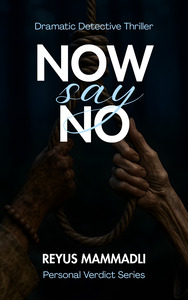
Now Say No
A short novel by Reyus Mammadli
Chapter 1. A Man Who Looked Like Thomas Wilmore
1851. North America. The Village of Norhill.
Twilight sank into the forest like a sodden shroud, heavy and close. The air stank of rot and soil crawling with tiny insects. Thomas Wilmore shifted—a mistake. The ropes only bit deeper into the loose skin of his neck. His arms were wrenched behind him, tightly bound to the trunk of a tree. His legs stretched out before him, also tied up.
At first, the pain was sharp and real. Now, it had drowned in the feeling of hopelessness.
He stayed silent, listening to his own labored breathing. The noose around his neck made it impossible to scream. But even if he tried, the forest would remain quiet.
And yet, he wasn’t alone.
A man stood nearby—the same man who had finished his monologue less than a minute ago. Now, he said nothing. He stared down at Wilmore the way one might look at a shadow about to be erased. There wasn’t a trace of pity in his eyes. Everything he wanted to say had already been said. Wilmore understood: there would be no mercy.
The man stepped back, walked over to his horse. Took his rifle from the saddle. And then, slowly—like a lab tech running a critical experiment—he began to load it: black powder, a wad of cloth, buckshot, another small wad. Precise. Measured.
“What do you want?” Wilmore croaked.
But the man was focused. Only when the rifle was fully loaded did he lift his eyes.
Wilmore looked up through tears, making no effort to hide them.
“I’m glad you’re crying, Tom,” the man said, cocking the hammer. “Tears are just right for this. Don’t you think?”
“I’m sorry...” Wilmore exhaled. “I... really am.”
The man stepped closer. Took aim. The moonlight caught the barrel of the shotgun, gleaming cold in the night. The muzzle swayed lazily—up, down. To his mustache. To his chin. Then back up again. The old man caught himself choosing where it might hurt less to take the shot.
His thoughts were cut off by the same voice. Steady. Almost weary—but with that same raw edge that, over the last few minutes, had become more terrifying than any blade.
“Now, Tom, do me a favor,” the man said. “Say no.”
“Why do you want that?” Wilmore said, his words dragging out. “You... you’re mad!”
“Do you want to die?”
“No.”
The shot rang out.
The man didn’t move. He stared for a moment at what was left. The victim’s leg twitched once or twice, then stilled—falling into the silence.
Then he looked down at his clothes. Checked. Clean.
Without turning around, he addressed the silhouette behind him: “Come closer. Remember. Every detail. We don’t have much time.”
“We found him, Mr. Gordon,” Peter burst into the yard, gasping for breath. It looked less like he’d been running and more like he’d tumbled down a slope. His clothes were filthy, his face streaked—mud or blood, it was hard to tell. He looked like someone who’d just come back from a place people don’t speak of out loud.
William Gordon met his eyes—calmly, without haste. He said nothing. Just gave a short nod, as if to say: Go on.
“He’s dead,” Peter forced out. “He’s... almost completely— He was killed, sir.”
Another figure appeared behind him. Bent over, hands on his knees, trying to catch his breath.
“If that’s really him...” the second boy started, but didn’t finish.
“It’s him,” Peter said firmly, without turning. “It’s Mr. Wilmore. I recognized him. By his eye.”
Gordon swore. Quietly, under his breath. But enough that Peter fell silent immediately.
Gordon turned and went back inside the house. The boys stayed where they were, exchanging looks. The village head came out in a hurry. He had boots on now. A rifle in his hand.
“Show me,” he said to Peter, dryly. Though a thread of worry still wove through his voice.
The men stood just a few steps away from what was left of their neighbor. William Gordon stood out among them—broad, more in width than in height. With age, his frame had thickened, and shortness of breath came easily now. He’d been standing there for at least ten minutes, yet the wheeze still clung to him.
Beside him were three grown men from the village—the ones people still listened to. Youngsters peeked from behind their shoulders, whispering.
“That’s really him?” a voice murmured.
“It’s him, for sure,” someone answered.
“Yeah, looks like him,” another agreed.
And really—who else could it be but old Wilmore?
At a distance, it almost looked like he’d simply fallen asleep, tied to the tree. But only from afar. The noose around his neck had slackened, no longer holding. His neck was torn open, his head slumped to one side, face down. The body leaned as if stretching toward the weak morning sun—its pale light adding color the scene didn’t need. Even without it, the horror was enough.
One eye remained—dull, unblinking. And a patch of forehead—clean, as if still clinging to one final thought. The mouth and chin were gone.
Ants were already crawling across his chest, over the fabric of his shirt—dozens of them. They came from the boots, up the pant legs, disappearing under the collar. Working silently. Indifferently. At least that’s how it seemed to the men standing nearby.
Scattered in the grass—dark pellets of buckshot, blood, flesh. If you looked closely, it all covered more ground than you’d think. But no one wanted to look closely. The light filtering through the trees slid past, almost touching him, but not daring to.
“Good thing the fox didn’t find him,” someone said.
“What?” Gordon looked up, pulled from his thoughts.
Carl Eaton, the village’s most respected hunter, pointed to the body—hesitantly. He’d seen a lot, but this had shaken him.
“A fox,” he repeated. He took the chewed reed from his mouth and tossed it into the grass. Then added, “Would’ve torn him up even worse.”
Old Morris stood leaning on his cane. He’d known Thomas since they were boys.
“How much worse could it get...” he whispered, voice heavy with sorrow. As if, in that mangled body, he saw something of himself.
William Gordon stared at the line of ants crawling across old Wilmore’s body. The insects knew exactly what to do with a dead man. It was time people figured it out, too.
He turned to Carl and gave a slight nod—let’s step aside. No one was surprised. The village head had taught them well: everyone in Norhill had their role, their place. And if Gordon had called on Carl Eaton, it meant this was serious. It concerned them all—whether they liked it or not.
They walked until the voices faded and the others were far behind. With every step, Carl realized just how badly Gordon didn’t want anyone overhearing a word. Not even a flicker of expression was meant to be seen. Gordon was about to stop when he heard a rustle. A squirrel. He went even farther. It was so perfectly in keeping with the man that Carl didn’t dare crack a smile.
Finally, they stopped. Gordon took a short, deep breath and glanced back toward the crowd gathering around the body. From here, they looked small—frightened and pitiful.
“How many shotguns in the village, Carl?”
Carl understood exactly where this was going. More than that—he found himself once again admiring the man’s cold clarity, his grasp of the moment.
“Twelve. Maybe fifteen at most,” Carl said. He already knew this wasn’t just a question—this was a task. After a short pause, he added, “Unless someone’s hiding one.”
Gordon glanced at Carl’s rifle—just enough to be noticed. Carl got the message. He had another one. A shotgun.
“It’s at home. Last fired a week ago. Duck hunting,” Eaton reported, eyes locked on Gordon’s.
Gordon gave a faint nod. “Ducks are fine.” Then, switching tone abruptly, he added, “Take two others you trust. Go door to door—everyone who owns a shotgun. Check them all. Whether they’d just been fired or freshly cleaned. You know what to look for.”
“I do,” Carl said, already forming a plan—who to take, which houses to start with, how to move.
The village head added, “Be careful. I don’t think that...” He stopped for a moment. “Still. Be careful.”
He weighed every word. Then, looking up at the hunter, he said, “Pay attention. Ask around. What people saw. Who they saw.”
Carl nodded. Got it.
Gordon looked at the sun. Then off toward the river. And said, “I want answers today. The sooner, the better.”
Carl let out a slow breath. The weight was heavy. A lot of the men wouldn’t take kindly to being suspected. But it had to be done. To keep living, they’d have to understand this death.
A woman’s scream rang out from the direction of the crowd. They turned. Of course—it was expected. Caroline, Thomas Wilmore’s wife. She was sobbing, held back by her daughter. Twenty-year-old Nora kept a cooler head. Though her eyes were wet. She stared at her father’s mutilated body. Held her mother tight. So tight she no longer noticed the pain she was causing.
“Hurry, Carl,” Gordon ordered. “I’ll handle things here.”
The women were led away. Someone suggested dousing the body with vinegar. It worked—most of the ants scattered. Then the corpse was wrapped in burlap and taken back to the village. To the place where gossip and fear had already arrived ahead of it.
The village, too, felt shot through.
